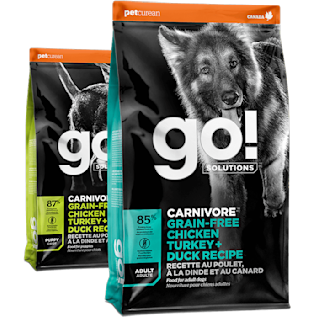March 19, 2025
Can Dogs Eat Eggs? A Complete Guide

Eggs are a common staple in many households, packed with high-quality protein, vitamins, and minerals. But can dogs eat eggs? And if so, are eggs good for dogs in all forms—raw, boiled, or with the shell? Let’s crack into the details.
Are Eggs Good for Dogs?
Yes! Eggs can be a great source of nutrition for dogs. They are rich in essential amino acids, healthy fats, and key vitamins like B12, riboflavin, and iron2.
Plus, eggs provide a protein boost, making them an excellent supplement for active or underweight dogs. However, moderation is key—while eggs are healthy, they should be part of a balanced diet rather than a primary food source.

Recommended Solution
Protein-Rich, Premium Quality Dog Food
Specially designed for high-energy dogs, these grain-free, protein-rich recipes deliver robust nutrition with an assortment of premium animal proteins including whole dried egg for a healthful, hearty meal.
View all Carnivore dog food recipes
Can Dogs Eat Raw Eggs?
Technically, dogs can eat raw eggs, but there’s no nutritional benefit in doing so and it comes with risks. Raw eggs may carry bacteria like salmonella, which can cause illness in both dogs and humans3.
Additionally, raw egg whites contain avidin, a protein that can interfere with the absorption of biotin1 (a B-vitamin important for skin and coat health). Cooking eggs eliminates these risks while preserving their nutritional benefits.
Can Dogs Eat Boiled Eggs?
Yes! Boiled eggs—poached or hard boiled, are one of the best ways to serve eggs to dogs. They retain all their nutrients and don’t have added fats or seasonings. Hard-boiled eggs, in particular, make a convenient and mess-free treat.
Can Dogs Eat Hard-Boiled Eggs?
Absolutely. Hard-boiled eggs are fully cooked, eliminating any risk of bacterial contamination or biotin deficiency. Just be sure to let the egg cool before offering it to your dog and serve it plain without salt or seasoning. Start with a small amount to see how your dog reacts; some dogs may have sensitivities to eggs and may experience digestive upset if too much is offered.

Can Dogs Eat Eggshells?
Eggshells are a natural source of calcium, which supports strong bones and teeth. While dogs can eat eggshells, they should be ground into a fine powder before adding them to food to prevent sharp edges from causing irritation or injury. If your dog already eats a balanced diet, additional calcium may not be necessary, so check with your vet before making eggshells a regular addition.
How Many Eggs Can Dogs Eat?
Eggs should be an occasional treat, not a meal replacement. Remember that treats and additional food items at mealtime should never exceed 10% of your dog’s daily caloric intake.
If your dog has dietary restrictions or allergies, consult your vet before introducing eggs into their diet.
Final Thoughts
So, can dogs eat eggs? Yes, in moderation and preferably cooked. Hard-boiled, poached, or scrambled eggs are the safest options, while raw eggs and eggshells should be approached with caution.
Alternatively, look for high-quality dog foods that incorporate egg as an ingredient, to reap all the nutritional benefits of eggs, without the extra work. As always, keep your dog’s overall diet balanced and consult with your veterinarian for the best nutritional choices.
Eggs can be a simple, wholesome addition to your dog’s diet—no complicated ingredients needed. Just crack, cook, and serve!
"Biotin Deficiency." ScienceDirect. Accessed March 3, 2025. https://www.sciencedirect.com/topics/biochemistry-genetics-and-molecular-biology/biotin-deficiency.
“Eggs, Grade A, Large, egg whole.” USDA FoodData Central. Accessed March 3, 2025. https://fdc.nal.usda.gov/food-details/748967/nutrients.
"Salmonella Prevention." CDC. Accessed March 3, 2025. https://www.cdc.gov/salmonella/general/prevention.html.


